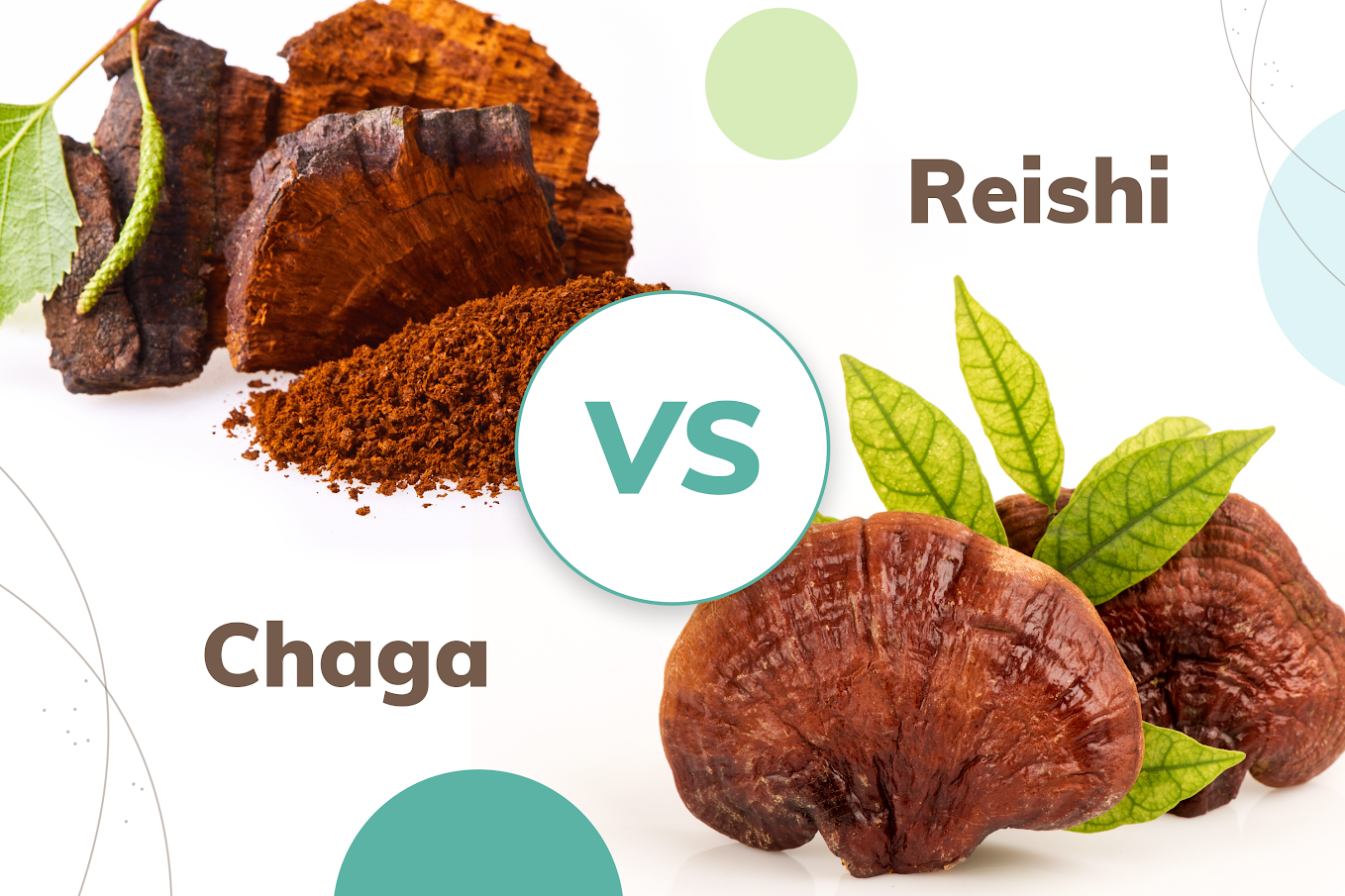
In the realm of holistic medicine, mushrooms have long held a special place for their potential benefits and wellness-boosting properties. Among these curious fungi, two have become standouts in the modern herb sphere: chaga and reishi.
Both celebrated for their contributions to the body and mind, these mushrooms have earned large reputations across numerous cultures.
Going head-to-head, we will delve into the benefits and drawbacks of chaga vs. reishi.
What is Chaga?
A strange looking fungus that resembles burnt charcoal, chaga (Inonotus obliquus) can be found in birch forests across the Northern Hemisphere, almost exclusively on trees. The chaga mushroom’s spores enter a tree through damage, spreading throughout the heart of the tree before bursting through its bark and forming its strange, burnt head.
Though chaga is a damaging fungus, destroying the host tree over time, it has a number of benefits as a medicinal herb for humans, such as:
Chock-Full of Antioxidants
Chaga emerges as a standout for its extraordinary antioxidant content. Within this curious fungus’ composition, there are a number of important antioxidants such as melanin (which gives chaga its dark color) and superoxide dismutase, both of which are potent agents that help fight free radicals in the body and support overall wellness.
Boosts and Fortifies the Immune System
Widely known for its immune-boosting potential, chaga can invigorate the immune system, enhancing the body's capacity to fend off infections and ailments. It is thought to do this by stimulating white blood cells, as found in this older study, which are paramount in the fight towards keeping your body healthy and happy.
Anti-Inflammatory Effects
Chaga is equipped with anti-inflammatory properties, capable of quelling inflammation within the body. This is an especially important boon, as inflammation causes a number of issues in our bodies, often resulting in pain and discomfort. chaga is thought to reduce inflammation by inhibiting the production of harmful cytokines, which can trigger inflammation, supported by this 2009 study.
Nutrient Abundance
Beyond its therapeutic attributes, chaga packs a nutritional punch. The mushroom contains a number of nutrients, including calcium, zinc, vitamin D, manganese, potassium, fiber, magnesium, iron, vitamin D, and B-complex vitamins.
What is Reishi?
Also known as lingzhi, reishi (Ganoderma lingzhi) is native to East Asia. Though it looks far more like a traditional mushroom than chaga, reishi is unique in the sense that its rust-colored caps lack “gills”—those soft lines on the underside—and grows in close clusters.
Reishi has been used in traditional Chinese and Japanese medicine for centuries, earning it the nickname “the mushroom of immortality,” though, of course, it doesn’t grant the consumer immortality. However, this unique fungus has a number of potential benefits to modern users, such as:
Adaptogenic Attributes
Though the idea of an “adaptogenic” herb is under some contention, reishi has earned a reputation as one of these stress-relieving remedies by assisting the body in adapting to stressors. This adaptability translates into relaxation and may help ease fatigue, anxiety, and even depression as found bythis 2011 study.
Immune System Booster and Inflammation Buster
Notably, reishi has the capacity to regulate the immune system. It can bolster the body's defenses against infections, while reducing inflammation in the body. Though more studies need to be done on the topic, one study found that reishi may reduce inflammation that can block the movement of white blood cells, while this 2005 study implies that reishi may help the body produce more white blood cells, which help your body stay healthy.
Strengthens the Cardiovascular System
As we grow older, the health of our hearts becomes a larger concern. Fortunately, reishi can be a natural way to help strengthen your cardiovascular system, as well as help regulate your body’s blood sugar. Numerous studies (like this older study) found that reishi may help decrease high levels of blood sugar, increasing healthy HDL cholesterol, as well as lowering lipid (fat) levels in the blood.
Antioxidant Armor
Similar to the chaga mushroom, reishi contains compounds that can protect against the cell damaging effects of oxidative stress. Though it doesn’t contain as many antioxidant properties as chaga, reishi is thought to improve antioxidant status within the body, strengthening their abilities. However, the research on this topic leaves much to be desired, as the results have been .
Chaga vs. Reishi: Which Mushroom is Best for You?
Two mushrooms, both with esteemed reputations as health and wellness-boosting powerhouses. It can be hard to decide between the two! In the battle between chaga vs. reishi, which is right for you?
If you’re looking for an herbal supplement that can boost your immune system, fight against inflammation, and prevent oxidative stress, both chaga and reishi fit the bill.
If you want a new way to get your daily vitamins and nutrients, chaga is the clear winner.
However, if you are seeking natural ways to combat stress and fatigue, reishi is the mushroom for you.
Don’t just take our word for it, though. Try out these two mushrooms for yourself! Check out our shop to pick your winner in the battle between chaga vs. reishi.

